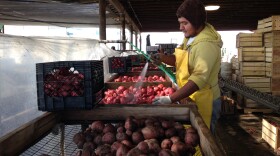
Dan Charles
Dan Charles is NPR's food and agriculture correspondent.
Primarily responsible for covering farming and the food industry, Charles focuses on the stories of culture, business, and the science behind what arrives on your dinner plate.
This is his second time working for NPR; from 1993 to 1999, Charles was a technology correspondent at NPR. He returned in 2011.
During his time away from NPR, Charles was an independent writer and radio producer and occasionally filled in at NPR on the Science and National desks, and at Weekend Edition. Over the course of his career Charles has reported on software engineers in India, fertilizer use in China, dengue fever in Peru, alternative medicine in Germany, and efforts to turn around a troubled school in Washington, DC.
In 2009-2010, he taught journalism in Ukraine through the Fulbright program. He has been guest researcher at the Institute for Peace Research and Security Policy at the University of Hamburg, Germany, and a Knight Science Journalism fellow at the Massachusetts Institute of Technology.
From 1990 to 1993, Charles was a U.S. correspondent for New Scientist, a major British science magazine.
The author of two books, Charles wrote Master Mind: The Rise and Fall of Fritz Haber, The Nobel Laureate Who Launched the Age of Chemical Warfare (Ecco, 2005) and Lords of the Harvest: Biotech, Big Money, and the Future of Food (Perseus, 2001) about the making of genetically engineered crops.
Charles graduated magna cum laude from American University with a degree in economics and international affairs. After graduation Charles spent a year studying in Bonn, which was then part of West Germany, through the German Academic Exchange Service.
-
Heirloom peach trees, and an essay about them, turned one California farm into a landmark of local food. It's now the scene of another unconventional choice: a daughter's return to take the helm.
-
Random tests of milk reveal that a few farmers are treating dairy cows with antibiotics that aren't supposed to be used on them. The FDA is now considering tighter controls to prevent such practices.
-
Produce growers often rely on workers who are in the U.S. illegally. Some farmers worry that if those workers gain legal status, they will leave agriculture. But some workers say they would stay.
-
Government regulators have approved the first genetically modified apples, which don't turn brown when you cut them open. But planting these trees will be a gamble since consumers may not want them.
-
Strawberry farmers have dropped a lawsuit against the University of California, Davis, and the university has hired a new strawberry breeder. But the future of academic berry breeding is uncertain.
-
Des Moines, Iowa, wants to control nitrate pollution — often called fertilizer runoff — in nearby rivers. But the best way to reduce it involves planting different crops, not using less fertilizer.
-
The competition over what Americans consume during the Super Bowl has gotten vicious. The nation's top merchants of virtuous and not-so-virtuous munching both want control of the line of scrimmage.
-
Beef processors continue to block efforts to bring back Zilmax, a drug that makes cattle put on weight faster. Is it because they're concerned about animal welfare, or beef exports?
-
Wondering why your local Chipotle is no longer serving pork? It's because a big supplier was housing pigs in confined quarters. But there's debate about whether that's really worse for the animals.
-
New GMO potatoes don't bruise as easily, and, when fried, they have less of a potentially harmful chemical. Yet some big chip and french fry makers won't touch them because of the stigma of GMOs.









